By Messenger Africa
 A container ship in the distance, seen from the shore of Berbera port, Somaliland.
A container ship in the distance, seen from the shore of Berbera port, Somaliland.By Jason Patinkin for The Messenger
With a sea breeze to his back, Ali Farah Negeye greets the lunch crowd at the Al Xayat restaurant in the Somaliland port city of Berbera. For the last fifteen years, he’s served lemonade and fried barracuda to a steady stream of regulars, who debate the topics of the day while watching fishing skiffs motor past the half-sunken hulls of ruined cargo ships. In the last year or so, though, Negeye says he’s seen new arrivals at the restaurant, mostly from other parts of Somaliland or its diaspora, but also a trickle of investors and tourists from the United Arab Emirates. “I can feel more customers,” Negeye says, as he relaxes following the afternoon rush. “People are understanding day after day the importance of Berbera.”
This is a welcome change for Negeye. For the last quarter century, there’s been little interest in Berbera, despite being along one of the world’s busiest shipping lanes. In 1991, Somaliland declared its independence from the rest of Somalia after a brutal civil war that killed tens of thousands of people. As Mogadishu fell into the anarchy from which it has yet to escape, Somaliland plodded along on its own, enjoying peace as it built a nascent democracy. While Ethiopia, Eritrea, and Djibouti are stuck in the tight grip of autocratic regimes, and Somalia and the Sudans suffer endless wars, Somaliland in its isolation has earned a reputation for relatively successful democracy and stability.
Negeye’s new customers signal that foreigners are taking a closer took at Somaliland again, and the government in the capital Hargeisa is responding. In the last six months, Somaliland’s authorities have entered into two long-term deals with the UAE to expand Berbera’s port and build a military base. The two projects, if completed, would bring nearly 700 million dollars in investment and might overhaul Somaliland’s economy.
But the deals bring considerable risks, too. Somaliland’s location along Red Sea shipping routes is also the crossroads of the Horn of Africa and the Middle East – the two most war-ridden regions on Earth. The two deals thrust Somaliland into a number of overlapping, high stakes political and economic rivalries involving the UAE, Ethiopia, Saudi Arabia, Iran, and other nations. Transforming Somaliland into a coveted piece of this regional chess board thus threatens to undermine the unique progress the breakaway state has made over the last 26 years.
“If you do try to play this role in international geopolitics, it’s a very risky game,” says Harry Verhoeven, a professor at Georgetown University’s School of Foreign Service in Qatar. “The rewards are of course very lucrative and that’s why you want to play the game, but getting it wrong can be potentially devastating.”
“Inviting interference”
Somaliland’s strategic importance has been known for centuries, evident in the architecture left behind by the various empires and fortune-seekers who passed through the city over the years. Up a small hill from the port, the minaret of a 19th-century Egyptian-Turkish mosque juts above the crumbling walls of former British colonial mansions and officers’ clubs. In the old city, storefronts originally built by Yemeni Jews and Indian traders now house teashops and private homes. The port itself is a product of modern imperialism: the Soviets built the current site in the 1970s, before the Americans took it over in the 1980s when Somalia switched its allegiance on the Cold War proxy battlefield.
The deals with the UAE could help return Berbera to its former prominence. The $442 million, 30-year port deal with Dubai Ports World (DPWorld), passed by Somaliland’s parliament in August 2016, would boost annual container capacity twenty-fold. Somaliland’s government estimates the deal will result in thousands of construction and service jobs, as well as millions of dollars a year in government revenue through profit sharing.
In Berbera, many in the business class looks forward to the port’s development. “People are expecting impact in a good way because the port will get investment,” says Negeye. “If we get a good investment for the port I expect that the business and the movement of the city will increase.”
Underpinning the port’s success is trade with landlocked Ethiopia, Somaliland’s closest ally and with 90 million people by far its largest neighbor. Currently, Ethiopia has access to only one modern seaport in Djibouti, and Somaliland hopes to capture some of that market share. To that end, Somaliland’s government says UAE will spend $250 million to build a highway between Berbera and Ethiopia and upgrade Berbera’s Russian-built airport, which boasts one of the longest runways in Africa but has largely fallen out of use, in lieu of paying rent for the military base, whose lease is for 25 years.
“It will be a huge gain for Somaliland,” Osman Abdillahi, Somaliland’s Minister of Information, says of the projects. “It will be a win-win for everybody.”
Yet for the UAE, for whom $700 million is a relatively small amount, Berbera’s allure is hardly economic. Instead, the port and military base appear part of a wider strategy by Arab Gulf nations including the UAE to establish a dominant presence in the Horn of Africa through construction of ports and military bases, training of armed groups, and payoffs of petrodollars to friendly Sunni governments. According to Verhoeven, this rapid investment in the Horn isn’t about trade, but about setting up a shield against Iran and its Shia allies.
“There really is this very strong belief in Riyadh and Abu Dhabi that Iran is hellbent on encircling them and toppling Gulf monarchies,” Verhoeven tells The Messenger. “The first layer of Gulf engagement with the Horn of Africa is this incredibly important proxy war with Iran. This is very much evident in Sudan, but also in a place like Eritrea and places like Somaliland and Somalia.”
So far, the UAE has a port and military base in Assab in Eritrea, from where it launches attacks on Yemen’s Iranian-backed Houthi rebels as part of the Saudi-led coalition. UAE has another base in Mogadishu, where UAE and Qatar are said to have poured money into recent elections, and whose government has voiced support for the coalition. UAE’s military has trained the Puntland Maritime Police Force (PMPF) into one of the most professional Somali armed groups, while DP World – the same UAE port company now in Berbera – plans to revamp the Puntland port of Bosasso. Saudi Arabia, meanwhile, plans to build its own military base in Djibouti. Further north, Gulf states have pumped dollars into Sudan, reestablishing ties with the African nation which previously had been allied to Iran. Khartoum now contributes forces to the Saudi-led coalition in Yemen as well, and has hosted joint exercises with Saudi Arabia’s air force.
For some observers, the Gulf’s military interest in the Horn is alarming, and its arrival in Somaliland marks a dangerous new phase. “One of the reasons Somaliland survived and Somalia didn’t from 1991 is because Somalia was interfered by everyone. Somaliland wasn’t,” Guleid Ahmed Jama, chairman of the Hargeisa-based Human Rights Centre, told The Messenger. “We were very suspicious of interference. Now we are inviting interference.”
“Dangerous places”
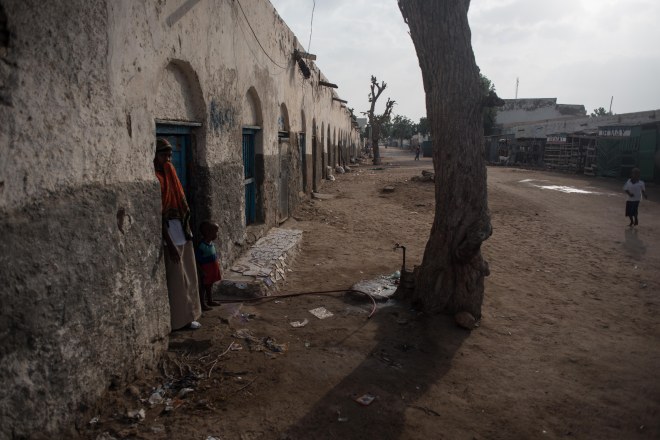
One oft-cited fear is that a military partnership with the UAE could end Somaliland’s neutrality in the civil war in Yemen, which lies across the Gulf of Aden from Berbera. Thousands of Yemeni refugees have crossed to Somaliland to escape that war, and their presence is a daily reminder in Somaliland of the consequences of being sucked into the Sunni-Shia power struggle that has destabilized the Middle East. Yet Somalilanders don’t need foreigners to teach them about the dangers of war.
“Whenever I hear about those military [coming to Berbera], I remember the air force that was killing the people,” says Hinda Osman, a Berbera resident, referring to indiscriminate bombings by Mogadishu during the civil war. Osman’s home in Berbera, a dilapidated colonial mansion which her family shares with a half dozen others, still bears bullet holes sustained from that conflict. When the war ended in 1991, refugee families like hers returned to Berbera and set up camp in whichever war-battered buildings still stood. They’ve lived as squatters ever since, but at least they’ve enjoyed peace, and they’re not willing to risk that any time soon. “If the UAE has a military base here, they will plan to attack from here to Yemen, and then in return, Yemen will also attack us.”
Hussein A. Bulhan, founder of Hargeisa’s Frantz Fanon University and a prominent Somaliland public intellectual, also strongly questions the merits of the UAE base, highlighting the risk of being drawn into the Sunni-Shia power struggle.
“Why does Dubai want a military base in this area? The only obvious thing right now is the war going on in Yemen and close access to that,” he says. “I don’t think it makes sense for us to be involved in a war in the region … I think it would be better that Somaliland becomes more of the island of peace it has been for a while.”
So far it’s unclear whether Somaliland has given UAE permission to launch operations on Yemen from Berbera. Before the signing of the deal, Somaliland’s Foreign Minister Saad Shire told The Messenger that specific point was still under negotiation. Since the signing, he has not answered repeated queries on this point, and the full text of the deal has not been released. Regardless, Shire dismissed concerns that Somaliland would be sucked into a wider regional war.
“Somaliland isn’t really interested or is not aimed to get involved in any war or any conflict in the region or beyond,” he said. “We are just using Berbera’s strategic location to advance our interests, which are really nothing more than development.”
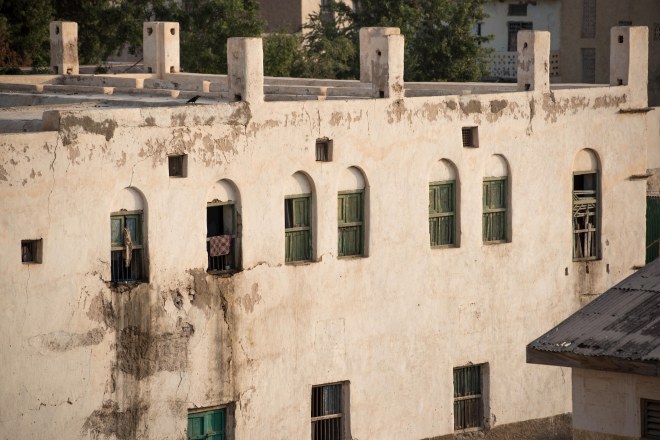
But a military deal with one of the belligerents in the Yemen war hardly looks neutral, and Somaliland’s information minister Abdillahi admits they support through official recognition Yemen’s Saudi-backed government over the Houthis. Still, Abdillahi contends the presence of UAE’s military in Berbera will actually strengthen Somaliland’s security, rather than erode it, including through UAE training of Somaliland’s naval and land forces. A recent resurgence of piracy is another reason for Somaliland to take extra precautions as it aims to make Berbera into a hub.
“With the Berbera port and its free zone coming into reality, we need someone to protect our seacoast. We have 850 kilometers, and that has a lot of dangerous places including what’s happening in Yemen, including a lot of pirates,” Abdillahi told The Messenger. “We have been doing all we can to protect, [but] we need their equipment, we need their knowledge. It’s imperative that we have someone who has got more resources than we have.”
Whether UAE base will be a bulwark or not, Somalilanders have already found themselves under fire as a result of the Yemen war. Earlier this month, an Apache helicopter believed to be from the Saudi-led coalition of which UAE is part, attacked a boat of Somali refugees off Yemen’s coast, killing dozens including Somalilanders. Somalia’s government in Mogadishu swiftly condemned the attack and demanded an investigation by the coalition, but Somaliland’s Foreign Minister Shire, who was in Abu Dhabi at the time for negotiations on the military base, was more cautious. When The Messenger asked how the attack would impact Somaliland’s relations with the Gulf and the UAE agreements, he demurred.
“I suppose this is under investigations, so really I cannot say,” he said. “We caution all parties to make sure that civilians are not affected in the conflict.”
Balancing act
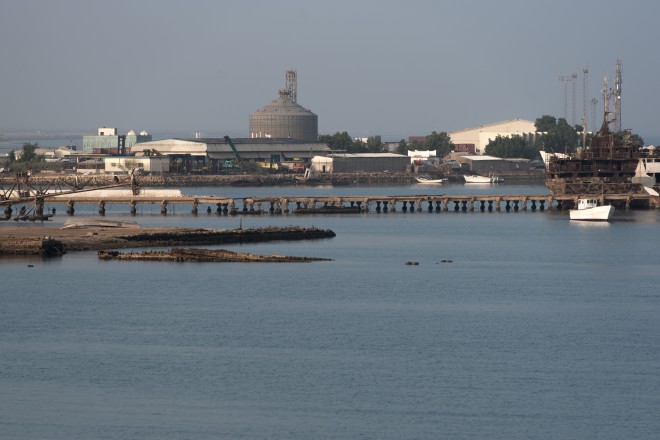
Whether or not the UAE base pulls Somaliland further into Gulf conflicts, the Arab-Iranian competition is only one regional power struggle which Somaliland will have to navigate following the Berbera deals. Perhaps an even greater worry than the Yemen war is that a UAE military base could upset Somaliland’s closest ally, Ethiopia. Though access to a second port would surely please Addis Ababa, the Gulf’s growing presence in the Horn also looks a lot like encirclement of the so-called “Christian Kingdom.” The fact the UAE has close military relationships with Ethiopia’s arch-rivals Eritrea and Egypt further raises alarm for Addis Ababa.
“In Berbera what you’re looking at is obviously from the Ethiopian standpoint concerning,” says Verhoeven. “The worry is that UAE in particular has been snatching up a number of ports in the Red Sea and the Indian Ocean area, and certainly substantially increasing its equipment and its military presence. There’s an incredible amount of skepticism about that, especially because Ethiopian and UAE relations are not particularly good.”
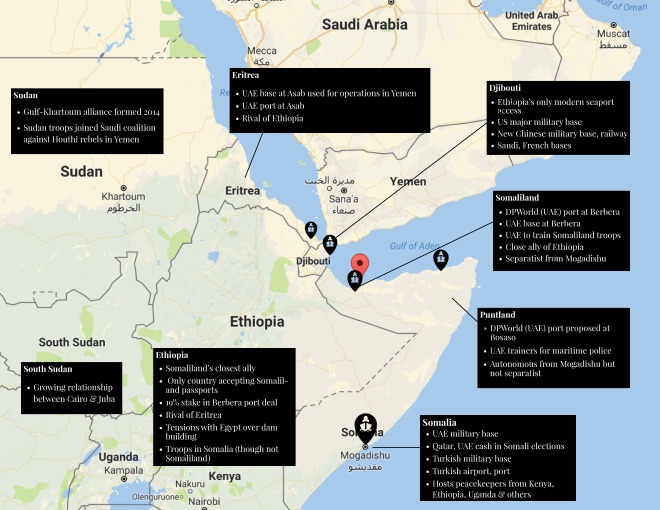
Upsetting Ethiopia is hardly in Somaliland’s national interest. Ethiopia is a main trading partner for Somaliland and the only country which accepts Somaliland passports. Ethiopia provides crucial diplomatic support to the breakaway state, including by hosting a large mission from Hargeisa in Addis Ababa, which gives the Somaliland government a platform to lobby the African Union and wider international community. Hargeisa and Addis Ababa also collaborate on security operations, particularly on immigration, and Somalilanders travel to Ethiopia for health care and education. But support from Ethiopia, itself a low-income country dealing with its own political upheavals, only goes so far.
“Somaliland’s government may be trying to send a signal to Addis not to take them for granted, and say, ‘look we might have other partners other than you who are willing to support us and provide us with a lot more cash than you can,’ ” says Verhoeven. “There are obviously important risks to this strategy namely that you end up disappointing the people who are so far the most loyal allies of your country.”
Foreign Minister Shire denied that Ethiopia had any concerns over the UAE deals. He added that Ethiopia recently has been brought on board in the port deal, and will have a 19% stake in the port itself, taking 5% of the total from Somaliland’s originally agreed-upon shares, and 14% of the total from DPWorld. That leaves DPWorld with a majority stake of 51% and Somaliland with just 30%, compared to 35% in the original agreement. Shire said this change to the deal was done for purely economic reasons.
The alliance with UAE draws Somaliland into other regional rivalries as well. The Gulf states have their own competition, with UAE and Qatar vying for equal footing with Saudi Arabia, and for supremacy in the Horn. Internally, clan tensions, and a struggle between Sufism and Salafism – stoked by Saudi influence in particular – continue to fester. The UAE’s investments also up the stakes of Hargeisa’s secession standoff with Mogadishu.
With all of these interests from regional heavy hitters, the question is how tiny Somaliland can balance its various, at-times conflicting allegiances. It’s certinaly not impossible: neighboring Djibouti’s leaders have successfully welcomed France, the United States, China, and Saudi Arabia, all of whom either operate or are building military bases in the port-nation. But Bulhan contends that Somaliland’s leaders are not nearly as savvy as Djibouti’s President Ismail Omar Guellah, pointing out that a succession of administrations in Hargeisa have all failed over the last twenty five years to gain recognition from a single country. And that lack of recognition in itself opens up Somaliland to greater risk.
“Somaliland because of its non-recognition, isolation, smaller state, is alway more vulnerable to more powerful states,” he says, specifically emphasizing Somaliland’s minority shareholder status in the port deal. “It’s not going to be a question of equity.”
Should UAE break or tamper with the deals, with its military in Berbera, Somaliland may have little recourse to accountability. Even restauranteur Negeye, an enthusiastic supporter of the port, is wary of the military base for this reason. Berbera residents have other concerns too. Numerous women, including Osman, told The Messenger they feared the arrival of foreign soldiers after hearing reports that African Union peacekeepers in southern Somalia raped local women there. (Somaliland’s information minister told The Messenger that UAE troops will not have immunity from prosecution).
But even Djibouti, with its nationhood and strong leadership, has suffered from hosting wealthy foreign militaries. Backed by the largest armies on Earth, President Guellah has entrenched his autocratic rule, tightening his grip on power over the last eighteen years. In Somaliland, there’s a similar potential for an erosion of open government, simply because the sums of money on offer are so large from Hargeisa’s perspective. The port deal, according to a summary distributed to parliament last August, includes an up front payment of 10 million dollars to the government, big money in Somaliland considering its 2016 budget was under 300 million dollars.
“The very fact that you have such neighbors with deep pockets has a very similar effect to say the sudden a discovery of oil. All of a sudden there is a huge inflow of cash, many of it of course unregistered, into the political system, so that raises the stakes of the game,” says Verhoeven. “Capturing the presidency or a ministerial portfolio has just become a lot more lucrative and potentially powerful than it was before, but it also gives far greater power to those who are already in positions of authority, and to buy their way to stay into power and consolidating their grip on it, and in that sense it can potentially be quite destabilizing.”
Indeed, in Somaliland, it appears the democratic backslide has already begun.
“The government’s behavior has changed”
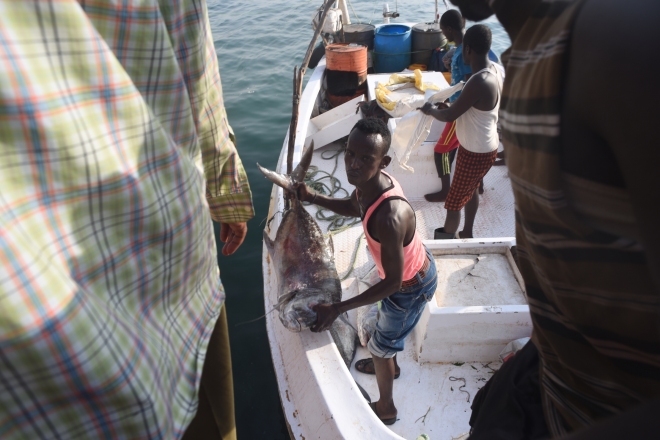
Berbera-based journalist Mubaarik Nirig has been arrested twice in the last two years. He would have been arrested a third time, after interviewing locals opposed to the DP World Port deal, if he hadn’t received a tip that police had a warrant with his name on it. He went into hiding until things cooled down. “Before [the deals] we never had this repressive attitude toward journalists,” he told The Messenger. “Of course there were little disagreements with the local government, small issues, but the national government and the arrests really has started with these two issues.”
The statistics bear this out. Jama, the human rights activist, says the majority of arrests related to freedom of speech in 2015 and 2016 were connected to the port deal. At least four journalists have been arrested this year so far, two of whom in connection with reporting or criticism of the port and military base. None of the arrests have been upheld in courts, but Abdillahi, the information minister has bluntly vowed to arrest other journalists who “threaten national security.”
The free speech crackdown reflects a wider lack of transparency and intolerance of dissent regarding the two projects. Parliament approved terms of the deals without seeing the full text of the agreements. In the case of the port, lawmakers received a detailed summary, but the final deal has never been made public. The revelation that the government has brought Ethiopia on board indicates the port deal remains mutable even after parliamentary approval, but there’s little public information of how it is being changed.
The deal for the military base is even more opaque. Parliament approved the basic terms’ of the deal without debate in a chaotic session in which opposing lawmakers were thrown out. The deal itself was believed to be the work of a small coterie of individuals close to the president, including his son-in-law who serves as Somaliland’s representative to the UAE and the Minister for the Presidency. And the fact that the talks were completed in the last year of the current administration further fuel suspicions of underhandedness.
“It’s not democratic. They talk about parliamentarians having made a decision, but they’re not even legitimate to be here,” says Bulhan, referring to the fact that Somaliland’s parliamentarians have sat in office for over a decade without re-election. “The democracy is degenerating out of these desperations.”
There was no substantive local consultation over the two projects, either. Even supporters of the port, like Yusuf Abdillahi Gulled, the director of Fair Fishing, an organization that promotes small-scale fishermen in Berbera, say bypassing locals was a mistake. “It was supposed to be a town hall meeting where all the people in the local communities come up, asked questions, proposed ideas,” he told The Messenger last August, shortly after parliament approved of the port deal. “For illiterate people which is the majority of our people, they cannot understand how things are, so they need to be confronted and have a meeting with them and tell them this investment will help their lives.”
With the lack of open discussion and transparency on the terms of the two UAE deals, negative rumors have flourished, stoked by local politicians who have seen their patronage networks upended with DPWorld’s arrival. There are widely held beliefs among Berbera residents that the land for the military base was purchased for just 1.2 million dollars and that DPWorld will conduct mass layoffs of port workers as they implement automation. Officials could probably assuage such fears with explanation and outreach — mass job cuts haven’t played out so far, for instance. Instead, the government has met local outcry with outright repression.
In August, troops deployed in Berbera’s streets when demonstrators planned to protest the sudden removal of the port manager. The demonstrators then cancelled their action. Later, the governor in Berbera banned public meetings from being held without prior government approval. Two weeks after DPWorld assumed control of the port, police arrested striking port workers complaining about pay. Days later, Somaliland’s National Security Minister banned all meetings to discuss the UAE military base.
“Essentially, the government’s behavior has changed,” says Nirig.
‘De facto’ recognition
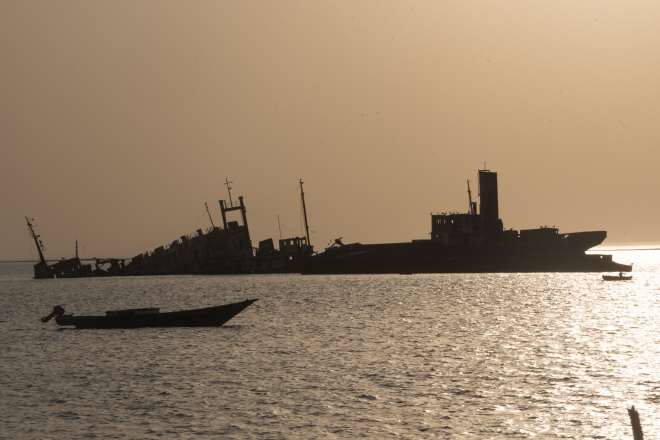
From his top floor office on Frantz Fanon University’s Hargeisa campus, Bulhan downplays the recent turmoil surrounding the UAE deals. He takes the longer view: Somaliland’s citizens were the ones who built the country after the war, he says, and they will carry on regardless of their leaders. He says that the government’s backslide on rights and transparency, though disappointing, is not surprising. Twenty five years of stability and fragile democracy has not resulted in recognition from the region or the west, so Hargeisa is looking elsewhere, despite the risks.
“I’ve been here for 21 years, and I see a society being rebuilt from total ruin,” he says. “It did a remarkable thing, but then these things are not sustainable in the long term [without recognition].”
Somaliland’s government seems to agree. Abdillahi, the information minister, makes clear that the hope for recognition is one reasons they’re looking to the Gulf. “We believe that if UAE has invested a billion dollars or more in Somaliland that’s a game changer for the international community,” he says. “They have their tentacles reaching a lot of different places, like an octopus, and we believe within that reach Somaliland will benefit in the long run, including recognition.”
Foreign Minister Shire is even more bullish: “I think the fact that we signed agreements with countries is itself a sign of recognition,” he said. “Somaliland is a de facto country.”
It’s an argument that doesn’t sway everyone in Berbera. Unless recognition is part of the deal, many residents told The Messenger, they have no reason to believe UAE will bestow it. But after a quarter century of isolation, it’s clear that Somaliland’s government is diving headfirst into the uncharted waters of increased foreign engagement anyway.
Back at Al-Xayat restaurant, Negeye gazes upon the ruins and potential in Berbera’s harbor. “Berbera will become an international place where all the world will come,” he says. What that will mean for the people of Somaliland remains an open question.
All photos © Jason Patinkin / The Messenger









/https%3A%2F%2Fblueprint-api-production.s3.amazonaws.com%2Fuploads%2Fcard%2Fimage%2F423288%2Fae2d8151-8fd7-4271-9459-ca3027da88ef.jpg?w=700)




